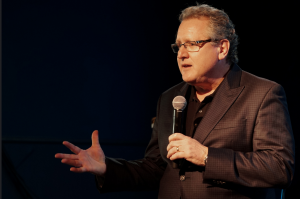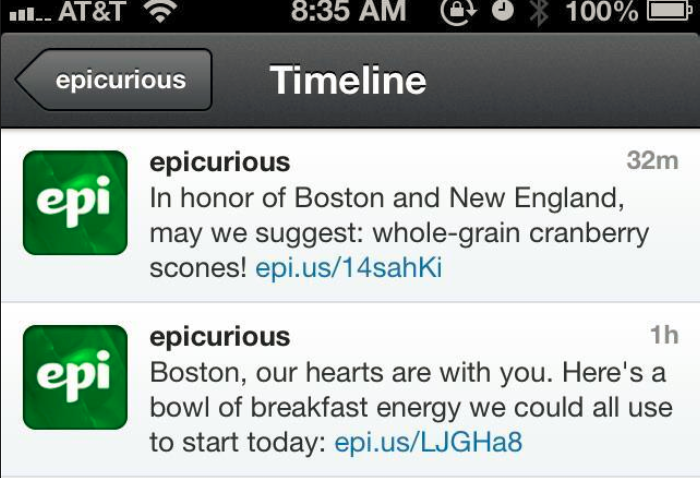By Mark Schaefer
This is a difficult post to write, but I have an issue on my mind … and that is usually a signal that it might be on your mind too. Let’s talk it out together.
When there is a crisis in the news like the Boston bombing and manhunt, social media adds a layer of complexity — and perhaps confusion — to an already complex and confusing situation.
Like nearly every American, I was transfixed by the TV images and felt shock from the havoc created by these two young men. It just felt like ANY social media posting other than something that was Boston-strong related was inappropriate.
But even with this awareness, when I read something interesting on the Internet during my day, I will instinctively tweet it (or schedule it to be tweeted later). I have been doing this day after day for years — assuming that if I’m interested in something, my Twitter tribe might be interested too. I read, tweet, repeat.
During the Boston crisis, I was mindful of the emotions of the country and toned down my normal chatter. While this extraordinary drama was occurring, I mostly stayed social media silent. But occasionally, as a result of my habitual Twitter routine, I would tweet something non-Boston related that I came across during my working day.
After one such tweet, a follower (who I had never heard from before) scolded me and told me to “turn off the auto-tweet.” Ironically, there were no auto-tweets. It was me, simply tweeting out of habit. Even though I was aware of the crisis and had adjusted, I guess my brain was on auto-pilot.
I didn’t respond to this person, and at first was a little put-off that some stranger would have to act like the Twitter police. But upon reflection, I do think there is something to think about here …
The Social Media Code of Conduct
The Boston scenario demanded our attention, our respect, and our focus. But what constitutes a crisis, and how should social media publishers respond?
After the Newtown school massacre, I literally shut down my blog and, for the most part, my social media presence. However, during the Boston crisis, like most other bloggers, I let the blog posts run as they had been pre-scheduled for the week. I’m not sure I can really explain why my judgment was different this time. Was that a mistake? Is that insensitive? Where do you draw the line?
What is the Social Media Code of Conduct?
In the heart of the Boston news coverage, I came across this story:
April 18 — A government rocket attack killed at least 12 people in a village in central Syria Wednesday, while rebels battled regime forces over two key military base. Two children and three women were among those killed. An amateur video posted online showed at least seven bodies, including a young girl with a bloody gash to her head, laid out on the floor of a room. A man can be seen wrapping the body of a boy in a white sheet as another man standing over them cries out, “Is this child carrying a gun? This child is 12 years old. Oh God. You gave him to me and now you are taking him.”
Were you aware of this story? Is this a crisis too? What is the relative importance of a massacre in rural Syria versus downtown Boston?
About half of the readers of {grow} are from outside the U.S. Would a reader in the Middle East find it strange that I stopped my blog for the death of three people in Boston and not for the slaughter of 12 people in Syria? In London? In Melbourne?
Some “rules” are obvious
During every crisis, there are inevitably individuals and brands who go viral over what is regarded as insensitive tweets and posts. This is one of the most egregious:
Certainly the tastelessness of these tweets is beyond debate.
Author and social media celebrity Guy Kawaski also got pillaged by bloggers over his auto-tweets (and his defense of them) during the Boston news coverage.
But somewhere between the mindless insensitivity of Epicurious and the mindless mindlessness of Kawasaki’s auto-tweets about the sex life of frogs, there is a gray area. There is a “stop-publishing” tipping point that is beyond just common sense. There is some combination of news coverage, emotionality, national pride, and drama that is more nuanced.
If I created a business-related post during a national crisis, am I in violation of the unwritten Social Media Code of Conduct? What is that Code of Conduct? What constitutes a national crisis? How do you define national crisis if more than half your audience is not part of that nation?
Unfortunately in the world today, there will be no shortage of tragedies to test us.
This is one of those times when I don’t pretend to have the answers and would like to hear from you. In an era when we are all learning how to be “publishers,” how do you handle the etiquette of publishing in a crisis?
 Mark Schaefer is the chief blogger for this site, executive director of Schaefer Marketing Solutions, and the author of several best-selling digital marketing books. He is an acclaimed keynote speaker, college educator, and business consultant. The Marketing Companion podcast is among the top business podcasts in the world. Contact Mark to have him speak to your company event or conference soon.
Mark Schaefer is the chief blogger for this site, executive director of Schaefer Marketing Solutions, and the author of several best-selling digital marketing books. He is an acclaimed keynote speaker, college educator, and business consultant. The Marketing Companion podcast is among the top business podcasts in the world. Contact Mark to have him speak to your company event or conference soon.
Image courtesy Provisions Flickr Creative Commons




